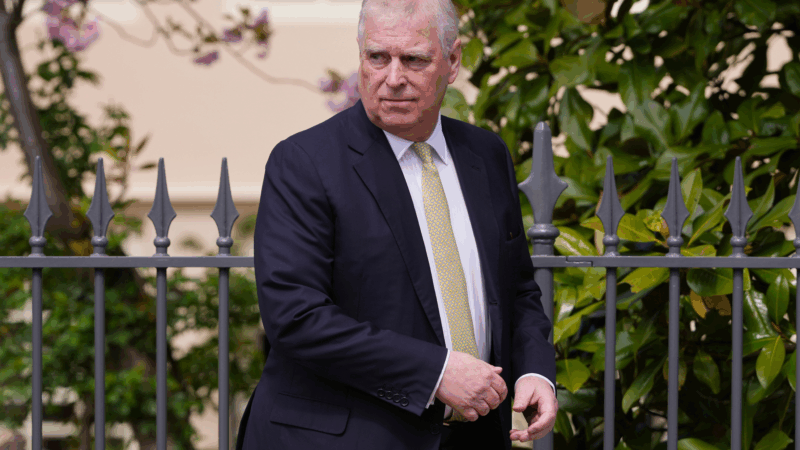Dave Portnoy on Trump, the ‘manosphere’ and ‘Barstool conservatism’
Dave Portnoy, the founder of Barstool Sports, was surprised when a team of NPR journalists asked to talk.
“If you told me I’d be on NPR and in a political leaning podcast like five years ago, I’d be like: You’re crazy,” he said during a conversation in a podcast studio near his home in Miami.
Portnoy is of interest after an election in which men voted heavily for Trump — and that included Portnoy, who is sometimes identified with “Barstool conservatism,” a brand of politics that, according to National Review, is a non-religious “potpourri of sexual libertinism, anti-authoritarianism, anti-wokeness, and lots of f-bombs.”
His business rose along with the internet and sports gambling. Barstool podcasts carry many, many gambling ads. As its creator, Portnoy has made enough money to own houses on Nantucket and near Miami while making million-dollar bets on football games and cryptocurrency. He’s also received years of criticism for remarks about unions, race, women, and even rape that he insists were jokes. He feuded with, and sued, Business Insider after it published stories alleging sexual misconduct, ultimately dropping an appeal in 2023 after his lawsuit was dismissed.
As a star figure in a media company that caters to a large male audience, he’s also seen as part of the “manosphere,” internet figures who speak to the interests, and sometimes the grievances, of male voters.
Portnoy spoke to Morning Edition as part of a series meant to put real questions to controversial or influential figures — people who may seem different at length than they do in our frantic, distracted, overheated national discourse. Previous guests include Rep. Alexandria Ocasio-Cortez, podcaster Steve Bannon and Harvard president Alan Garber.
Below are a few key points from the interview, which you can watch above.
The style matters as much as the substance
Portnoy seemed most focused on culture and attitudes. He said his vote for Trump was more “an indictment of the Democrats than an endorsement of Trump’s politics.” The indictment of Democrats centers on a lack of “blunt talk,” an excess of “woke politics,” and what he perceived as a desire to “shame” men in general and him in particular.
He differs with Trump on several issues
If politics was purely about issues, Portnoy might be closer to Democrats. He favors abortion rights, and when he talks about immigration, he seems a bit more lenient than the Trump administration.
“I don’t necessarily think you should go back in time,” he said. “If somebody isn’t here legally, but they’re a productive member of society with no issues, I don’t think that you go say, ‘Get out of here.'”
He’s very successful and feels looked down upon
In explaining his tilt to the right, Portnoy talked of founding Barstool as a four-page paper newspaper on sports gambling in the early 2000s.
“I started a business from scratch and really didn’t get any help, moved home, worked, didn’t take a vacation day for 10 years and grinded my ass off to get where it is. And I felt that I should somehow have shame as being a white person who wants to make a lot of money and live a great life. And that bothered me.”
His language seems to have evolved, a little
During our conversation, Portnoy mentioned a word suggesting society was becoming more feminine that he “would have used back in the day.”
He also recounted a moment that, he says, still leads him to be labeled racist: He sang the N-word in a social media post years ago, one of a number of times he used the word. “I would never do it again,” he says now. “But different times …. I didn’t realize the impact that it would have on some people. I won’t do it again. But there is context to things. There’s more texture to things. And a lot of times I feel like in this internet age, it has blown out. I mean, that clip still gets used against me. If someone doesn’t like me, I hear that every time.”
More recently, the free speech advocate has made news by denouncing the use of a slur against Jews in a Barstool bar in Philadelphia.
He could vote for a Democrat
“I would vote for a Democrat. And I have voted for Democrats,” he said, but added that he didn’t want to be “demonized” by the party for his language and views. “Not everything is nearly as serious as it may seem,” he said. “Guys can say a girl is pretty without being sexist.”
That ain’t perfume! Ancient bottle contained feces, likely used for medicine
Researchers found a tiny bottle from ancient Rome that contained fecal residue and traces of aromatics, offering evidence that poop was used medicinally more than 2,000 years ago.
Britain’s former Prince Andrew arrested on suspicion of misconduct in public office
Andrew Mountbatten-Windsor, formerly Prince Andrew, has been arrested on suspicion of misconduct in public office.
Urban sketchers find the sublime in the city block
Sketchers say making art together in urban environments allows them to create a record of a moment and to notice a little bit more about the city they see every day.
Epstein once attended an elite arts camp. Years later, he used it to find his victims
Jeffrey Epstein and Ghislaine Maxwell lavished money on the Interlochen Center for the Arts to gain access, documents show — even funding an on-campus lodge they stayed in. In the process, two teenagers were pulled into their orbit.
An unsung hero stepped in to help a newly widowed mom in a moment of need
Barbara Alvarez lost her husband in 2017, just before their daughter went off to college. Her unsung hero helped her find the strength to be a single mother to her child at a key moment in their lives.
How a recent shift in DNA sleuthing might help investigators in the Nancy Guthrie case
DNA science has helped solve criminal cases for decades. But increasingly, investigative genetic genealogy — which was first used for cold cases — is helping to solve active cases as well.






